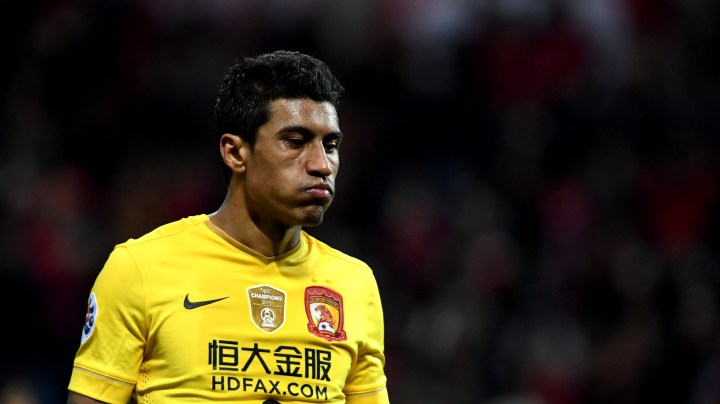Is Barcelona Crazy For Paying $47 Million For Paulinho?

Paulinho looks on after a AFC Champions League Group H match between Urawa Red Diamonds and Guangzhou Evergrande. Photo by Masashi Hara/Getty Images.
It’s been a soccer summer of mega-money in a mega market, with inordinate fees and money swishing around in unprecedented fashion. We thought we’d reach the peak just a couple of weeks ago, but perhaps not even Neymar’s $264 million from Barcelona to Paris Saint-Germain is as curious as Paulinho’s $47 million move from Chinese club Guangzhou Evergrande to Catalonia, as officially announced on Monday by the blaugrana.
https://twitter.com/FCBarcelona/status/897053752821252097
After flopping at London club Tottenham Hotspur, the physical midfielder moved to China, tempted by an obscene salary as part of China’s soccer gold rush. His transfer was a contemporary tragedy: a talented Brazilian, not even at the height of his formidable talents, moving away from the footballing epicenter–with its excellent leagues and the teeming grandeur of the Champions League–to an underdeveloped league in Asia.
It seemed a decadent, premature, and ill-conceived retirement plan for the Copa Libertadores and Club World Cup winner. Much excitement had surrounded his arrival in the English capital back in 2013. Paulinho was a typical English-style midfielder, but with a Brazilian touch. He could play as a conservative midfielder, but excelled when bombing forward. He was the Brazilian Frank Lampard, with his penalty-box infiltrations and powerful right foot.
A preposterously great career map was projected for the Brazilian at White Hart Lane, but yet little of all the promise he held materialized. Paulinho didn’t adapt to the Premier League, suffered injuries, lacked an all-round attacking ability, and lost his confidence. He soon disappeared from first view and from the club’s long-term planning and exited via a backdoor to China.
In Guangzhou, he was reunited with Brazilian coach Luiz Felipe Scolari. He became a vital cog in the midfield of the Chinese outfit and won the Asian Champions League in 2015. He is the first player to move back to Europe from China, and to a bigger club to boot. It is, with the benefit of hindsight, a very roundabout route to Barcelona.
Paulinho is also the first arrival at the Camp Nou since Neymar’s departure, but he won’t restore balance to the Catalan universe, so distorted by PSG and the economic imperatives of the modern game. MSN, the South American trident and Barcelona frontline, is no longer. They, the sum of their parts and vice versa, defied footballing logic and offered aficionados so much titillation.
The acquisition of Paulinho doesn’t assuage the gaping and harrowing reality of Neymar’s departure. The new Brazilian may struggle to integrate, even if La Masia products Sergi Samper and Sergi Roberto leave. His talent might still be there, but Barcelona fans may target him as a scapegoat for the incompetence of the club’s board. He is, after all, not the Brazilian they craved, nor is he Ousmane Dembélé.
He brings neither flair nor star power. The hardened Paulinho is a gamble in Barcelona’s virtuoso midfield. In recent seasons, the club’s transfer policies have been questionable, with Arda Turan and Andre Gomes offering little added value to the team. Paulinho certainly seems along that same vein, but perhaps, the true measure of Paulinho’s value and merit is his renaissance with the Brazilian national team.
At Corinthians, Paulinho had worked with current Brazil coach Tite. The duo won domestic, continental, and world titles. So, when Tite took command of Brazil, he didn’t hesitate to reintroduce Paulinho to the Seleçao midfield. Observers frowned over the shock recall, but Tite was soon proven right.
Paulinho has been instrumental in Brazil’s turnaround in the World Cup qualifiers, displaying great all-round awareness. Notably, he excelled against rivals Argentina and Uruguay. He often burst into the opposing box and scored three goals, while never forgetting his defensive duties.
“Paulinho shut up his critics, and I am one of them,” wrote 1970 legend Tostao in a column. “Once again, he was average as a midfielder, his main function, and great as a striker, since he is so good at ghosting into the box. He used to score plenty of goals for Corinthians. At Tottenham, since he did not do much marking, the English could not understand how he was first choice for Brazil.”
The 29-year-old proved Tostao wrong. At Barcelona, he’ll be hoping to prove his critics wrong again. The fate of Barcelona, and its board, rely on the returning Brazilian, home from Asia with a chip on his shoulder.